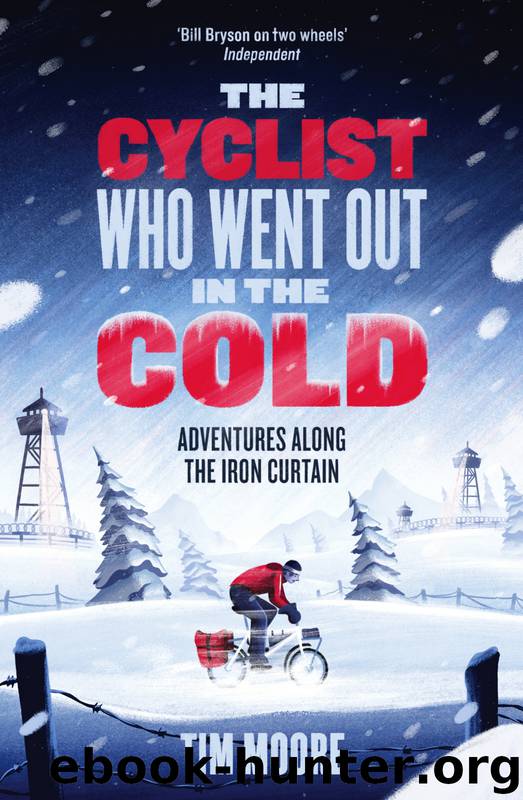The Cyclist Who Went Out in the Cold by Tim Moore

Author:Tim Moore
Language: eng
Format: epub
Publisher: Random House
Published: 2016-10-06T04:00:00+00:00
10. THE GERMAN BALTIC
After its memorable and heroic three-month absence, my MIFA came home without ceremony. One minute I was rattling down a boulevard flanked with stalls flogging cheap fags and fake football shirts to cross-border Germans; then came a blink-and-miss-it roadside round-up of national speed limits, and I was in. At once the full parade of stereotypes – the lazy, the patronising, the offensive – marched out around me. Spotless cars drove down velvet roads with a careful obedience that was hard to attune to: I approached one of those digital watch-your-speed displays in a 40 zone and saw it clocked at 38, 39, 39, 38, 38, 11 (me). The hedges were clipped and the pavements almost shone. The farms looked like parks and everyone was wearing lederhosen made out of sausages. After weeks of potholed shonkiness it seemed unreal, like a model village.
And this was, or until recently had been, East Germany – just a Commie knock-off of the real thing. I had to look hard for evidence. The five-floor tenement blocks were a giveaway, but even these bore little resemblance to those perpetrated by Soviet Russia elsewhere across its empire. Each had a homely pitched roof and pastel-painted walls that didn’t seem to have been fashioned from cardboard pulp and asbestos. But then the GDR was the Soviet poster girl, its flagship western outpost, the one place where their brand of Communism almost made it. No one here ever queued for food or went hungry. Welfare provisions were a class above any East European neighbours, indeed the envy of many in the West: education standards ranked amongst the highest in the world, and eighteen million citizens were generally over-qualified for the blue-collar jobs that most ended up in. In 1984, the World Bank rated the GDR as the world’s twelfth strongest economy, and the CIA told Reagan it was poised to overtake West Germany. A nation that wasn’t even recognised by the International Olympic Committee until 1968 established immediate sporting dominance: from 1972 onwards they finished every Olympic Games, summer and winter, in the top three on the medals table.
It was another crisp, bright afternoon, and I bowled down a series of sun-stippled clifftop paths threaded with pensioners on electric bikes, kicking some serious old arse along the way. Strange as it felt to think of all these German retirees as former Communists – much stranger than it had amongst elderly Russians, Balts or Poles – now that I thought about it, the clichéd Teutonic mentality seemed uniquely well suited to the Soviet ethos. Hard work and healthy play, reliable efficiency, wholesale compliance and the readiness to denounce those who betrayed it … Even that hearty, no-funny-business approach to naturism was a good fit.
The path was punctuated with GDR-vintage campsites, most still up and running and mercifully fully clothed. I was interested to note the number of static caravans flying the German flag: displays of national pride were understandably a bit iffy in the post-war decades, and flags weren’t waved en masse in Germany until the country hosted the 2006 World Cup.
Download
This site does not store any files on its server. We only index and link to content provided by other sites. Please contact the content providers to delete copyright contents if any and email us, we'll remove relevant links or contents immediately.
Shoe Dog by Phil Knight(5256)
The Rules Do Not Apply by Ariel Levy(4956)
Walking by Henry David Thoreau(3950)
How to Read Water: Clues and Patterns from Puddles to the Sea (Natural Navigation) by Tristan Gooley(3458)
Running Barefoot by Amy Harmon(3442)
I'll Give You the Sun by Jandy Nelson(3428)
Crazy Is My Superpower by A.J. Mendez Brooks(3394)
How to Read Nature by Tristan Gooley(3332)
How Music Works by David Byrne(3257)
The Boy, the Mole, the Fox and the Horse by Charlie Mackesy(3108)
The Fight by Norman Mailer(2924)
Seducing Cinderella by Gina L. Maxwell(2639)
Cuba by Lonely Planet(2626)
Accepted by Pat Patterson(2363)
Going Long by Editors of Runner's World(2356)
The Unfettered Mind: Writings from a Zen Master to a Master Swordsman by Takuan Soho(2294)
Backpacker the Complete Guide to Backpacking by Backpacker Magazine(2238)
The Happy Runner by David Roche(2233)
Trail Magic by Trevelyan Quest Edwards & Hazel Edwards(2177)
